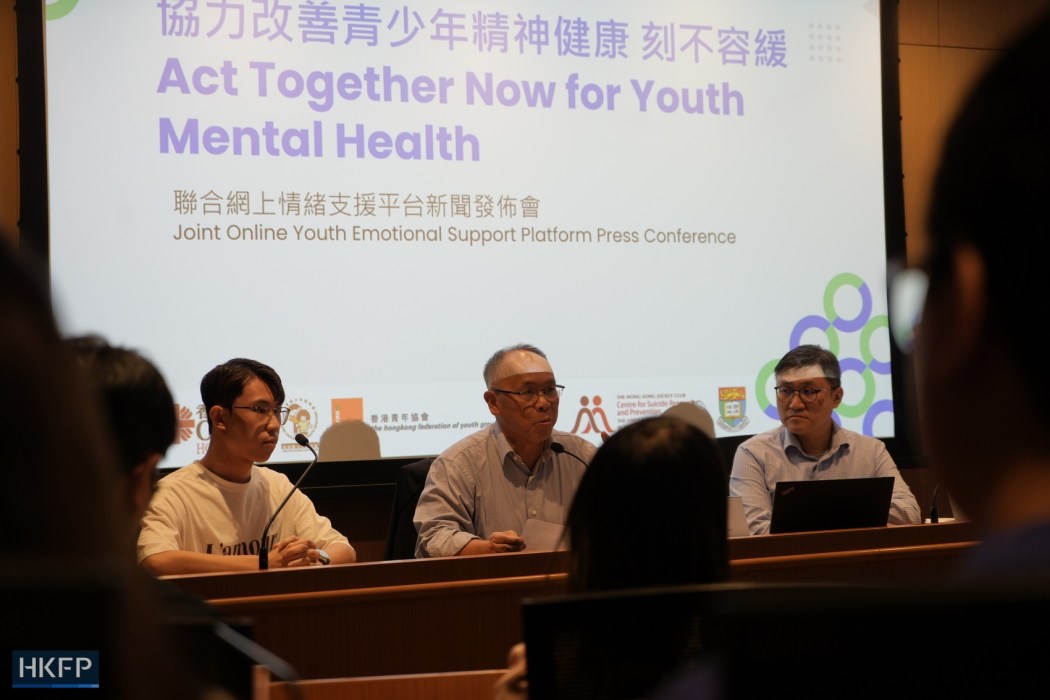Five NGOs in Hong Kong have called for more support for youth struggling with their mental health amid a sharp surge in student suicide cases.

The Hong Kong Jockey Club Centre for Suicide Research and Prevention at the University of Hong Kong (HKU) said on Tuesday it recorded 22 suicide cases – including attempts – involving people under the age of 18 or tertiary students in the past three months. The figure is double from the same period last year.
The research centre together with five NGOs – Caritas Hong Kong, the Boys’ & Girls’ Clubs Association of Hong Kong, the Hong Kong Federation of Youth Groups, Hong Kong Children and Youth Services, and St. James’ Settlement – held a press conference on Tuesday.
Paul Yip, director of the centre and chair professor of HKU’s Department of Social Work and Social Administration, said the situation was worrying. He said that school-related pressure and family issues were common sources of distress among young people who took their lives.

“But the cause is seldom singular. Usually there are multiple causes co-existing and affecting each other,” he said in Cantonese, adding that schools and parents could work together to protect the well-being of students.
The resumption of class after years of online learning during the Covid-19 pandemic, as well as broader changes in the community, also affected students’ mental health, Yip said.
“I think the students… do take a lot of time to adjust to the so-called new normal,” he said in English.
“Also the changes in the community, in their friendships and network… or some of their favourite teachers have left the schools, these are causing… barriers for them to seek help,” he added.

Charlie Chan, the service head at Caritas Hong Kong, said the five NGOs had been providing online emotional support services for young people.
According to their data, 10.3 per cent of secondary school students who sought help via the services in the past three months were high-risk cases, meaning they had suicidal thoughts or self-harm tendencies. The figure was up from 6.5 per cent in the same period last year.
“This means approximately one out of ten secondary school students [who used the service] had suicidal thoughts,” Chan said in Cantonese.
He also said that mental health struggles were most frequently mentioned by troubled youth, followed by academic problems and family issues.

The tendency for family members to misunderstand when youth opened up about their distress had worsened their emotional crises, Chan added.
Quoting a student who sought help through an online chat platform, Chan said: “For so long, they’ve not understood. I don’t even know where to start [explaining to them].”
The NGOs in Tuesday’s press conference called for schools to provide more mental health support for their students, as well as create an environment where students feel safe to seek help.
Parents and the public should also pay closer attention to “warning signs” among the youth – including behavioural changes, mood swings, or unusual behaviour on social media – and provide timely care, the NGOs said.
Youth suicide on the rise
Yip on Tuesday said their data on student suicides was preliminary as suicide figures had to be finalised by the Coroner’s Court, which looks into causes of death. But there had been an upward trend in youth suicide over the past decade, according to official figures.
Statistics compiled in the annual Coroner’s Report, which summarises yearly statistics relating to death in the city, showed that 39 Hongkongers aged 19 or under died by suicide last year. The number is up from 15 in 2013.
Last month, the Samaritan Befrienders Hong Kong, another NGO specialising in suicide prevention, called for greater attention to mental health issues among the youth. It also said the rise in student suicides could be attributed to the city’s return to normalcy after years of Covid-19 and an unreasonable level of academic pressure in some schools.
Besides the responsibility of schools and the community to step up support, Yip also reminded young people to look for help during moments of distress.
“Seeking help is a sign of strength, it is not a sign of weakness. When you’re reaching out, the help is [there],” he said.
See also: HKFP’s comprehensive guide to mental health services in Hong Kong
| 💡If you are in need of support, please call: The Samaritans 2896 0000 (24-hour, multilingual), Suicide Prevention Centre 2382 0000 or the government mental health hotline on 18111. The Hong Kong Society of Counselling and Psychology provides a WhatsApp hotline in English and Chinese: 6218 1084. See also: HKFP’s comprehensive guide to mental health services in Hong Kong. |
Support HKFP | Policies & Ethics | Error/typo? | Contact Us | Newsletter | Transparency & Annual Report | Apps
Help safeguard press freedom & keep HKFP free for all readers by supporting our team

LATEST FROM HKFP
HKFP has an impartial stance, transparent funding, and balanced coverage guided by an Ethics Code and Corrections Policy.
Support press freedom & help us surpass 1,000 monthly Patrons: 100% independent, governed by an ethics code & not-for-profit.










